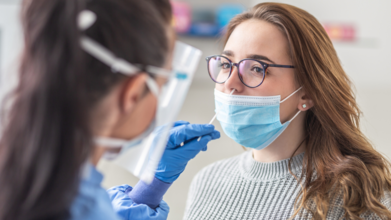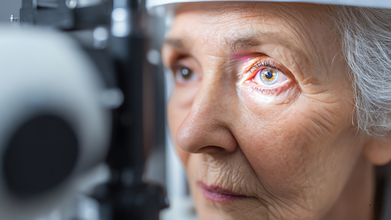- Health Conditions A-Z
- Health & Wellness
- Nutrition
- Fitness
- Health News
- Ayurveda
- Videos
- Medicine A-Z
- Parenting
COVID Symptoms Are Different In 2025—How Long After Exposure Should You Get Tested?

Credits: iStock
When someone close to you tests positive for COVID-19, it’s natural to feel an immediate sense of urgency. The question that often follows is simple but critical: how long should you wait before getting tested? Testing too soon can give you false reassurance, while delaying too long risks spreading the virus to others. The answer lies in understanding the incubation period, the type of test you use, and the circumstances of your exposure.
COVID-19 doesn’t reveal itself instantly. It takes some time for the virus to reproduce in your body until it can be detected by tests to the level that it is present. That window is called the incubation period, and it is usually 2 to 14 days, with infections usually appearing on days 3 to 7. Waiting too long to test results in a false-negative reading because viral load isn't adequate yet. That is why professionals call for waiting for the appropriate moment before swabbing.
Also Read: What Is Chagas Disease? What Are the Symptoms? Is This 'Kissing Bug' Infection Deadly?
When To Test For COVID If You Have Symptoms?
If you get symptoms like fever, cough, tiredness, stuffiness, or loss of smell and taste—you need to test immediately. A positive antigen test is most often accurate, but a negative one isn't always the end of the matter. Since rapid tests may not catch early infections, particularly within the first days, the FDA and CDC advise retesting 48 hours later if your initial test was negative but you continue to have symptoms.
When to Test for COVID if You Do Not Have Symptoms?
For people without symptoms but with known exposure, the CDC advises testing on Day 5 after exposure. Counting starts on the day of exposure, which is considered Day 0. By Day 5, the virus is typically detectable in most individuals. Testing earlier may be useful if you’re planning to be around vulnerable populations, but it’s important to confirm results later in the incubation period with a follow-up test.
Types of Tests for COVID-19 and Accuracy After Exposure
Rapid Antigen Tests
- Speed: 15–30 minutes.
- Advantages: Suitable for rapid decisions and testing at home.
- Drawbacks: Less sensitive, particularly in the initial periods of infection or among asymptomatic individuals.
- Optimal Use: Day 5 or later since exposure; retest after 48 hours if negative.
PCR Tests
- Speed: Results usually within 1–3 days.
- Advantages: The gold standard because highly sensitive, able to identify even traces of the virus.
- Limitations: Has to be processed in the lab, longer turnaround.
- Best Use: Day 5 after contact for best accuracy.
Antibody Tests
- Speed: Variable, but not useful immediately.
- Strengths: Can identify past infection, not current.
- Limitations: Antibodies typically show up 1–3 weeks after infection.
- Best Use: To ascertain past exposure, not to test right after contact.
Why Testing Too Early Can Give Misleading Results?
Testing within 1–2 days of exposure rarely provides accurate results. At this stage, the virus is still incubating and your immune system hasn’t produced a detectable viral load. A negative result during this period can create a false sense of security, potentially leading to unintentional spread. Waiting until Day 5, unless symptoms appear earlier significantly improves accuracy.
COVID Testing Timeline Guideline
Day 0: Exposure occurs. Begin monitoring for symptoms.
Days 1–3: Remain vigilant. Avoid social contact, but delay testing unless symptoms occur.
Day 5: Test with PCR or an antigen test. If you use an antigen test and it comes back negative, retest in 48 hours.
Day 6–7: If you received a negative test result but are still worried—or must see someone high-risk—opt for a second test.
What to Do if You Test Positive?
A positive test result indicates you should self-isolate right away, notify close contacts, and adhere to public health advice. Most individuals with mild signs or symptoms can recover at home, but individuals with high-risk conditions—e.g., chronic illness, compromised immunity, or advanced age—should see a health care provider for potential antiviral treatment.
Isolation is usually 5 days from onset of symptoms or positive test (in case of being asymptomatic), but at least 10 days of masking around other people is recommended.
What if You Test Negative?
A negative test is not always conclusive. Taken too early, or if you don't have symptoms, the virus may not be visible yet. Keep on masking, watching for symptoms, and retesting as needed. If you have a subsequent onset of symptoms after a negative test, consider the infection to be possible and retest soon.
Where to Get Tested for COVID?
Testing for COVID-19 is widely available in various settings to accommodate a variety of needs. Home rapid tests, found at pharmacies and drugstores, are convenient and provide fast results, but a follow-up test is suggested if the test is negative but symptoms are still present. Healthcare clinics and pharmacies sell antigen and PCR tests, and some have appointments. Free or low-cost testing can be found at community clinics and public health clinics, especially in outbreak situations. For patients with respiratory symptoms, most clinics ask that they pre-call to reduce waiting room exposure, and telemedicine consultations are becoming more widespread throughout many areas.
Even in 2025, with better treatments and vaccines, testing is important. It catches infections early, informs isolation and treatment decisions, and safeguards at-risk populations. The CDC insists repeatedly that prompt testing—particularly following confirmed exposure—is among the best measures to slow spread.
If you’ve been exposed to COVID-19, resist the urge to test right away. Instead, monitor for symptoms and plan to test around Day 5 post-exposure. Use rapid antigen tests for quick answers, but rely on PCR tests for the most accurate results. Regardless of your test outcome, continue practicing precautions, especially around high-risk groups. Testing at the right time doesn’t just protect you—it protects your community.
The Hidden Glaucoma Warning Signs Every Middle-Aged Adult Should Know

Credit: Canva
Glaucoma is an umbrella term for a group of eye diseases that create pressure inside your eyeball, which can damage delicate, critical parts at the back of your eye, including the optic nerve.
While most of the diseases are progressive, meaning they gradually get worse and eventually cause permanent vision loss and blindness. In fact, glaucoma is the second-leading cause of blindness worldwide and is the leading cause of blindness for people over 60 years old.
Dr Niteen Dedhia, Medical Director, Ojas Maxivision Eye Hospital tells Business Standard: "Glaucoma slowly and quietly causes damage to the optic nerve. Changes in eye pressure, blood flow and nerve fibres occur over time, while the brain often compensates for the loss.
"As a result, symptoms go unnoticed, and by the time vision loss becomes apparent, the damage is usually permanent."
Many forms of glaucoma have no warning signs and the effect is extremely gradual, to the point that you may not notice a change in vision until the condition is in its late stages.
Here are some symptoms that mid-age people need to keep an eye out for:
1. Gradual loss of circumferential vision
One of the earliest symptoms of glaucoma is damage and subsequent loss of peripheral vision. Dr Dedhia noted: “Glaucoma starts by damaging the peripheral vision but doesn’t affect the centre (front) vision."
If you seem to struggle with spotting objects approaching from the side or bump into things more often, you may be experiencing early stages of the disease and not merely experiencing normal ageing.
2. Difficulty seeing or reading in the dark or low light settings
Difficulty adjusting to darkness, discomfort in dimly lit spaces or having trouble navigating at night can be early warning signs may point to reduced contrast sensitivity linked to glaucoma rather than simple eye strain.3. Frequent changes in eye power
Dr Neeraj Sanduja, Ophthalmologist, Eye Surgeon at Viaan Eye Centre, Gurgaon told the publication: "Needing frequent prescription changes or feeling that glasses 'never feel quite right' may reflect subtle visual field changes caused by glaucoma rather than simple refractive error progression."
4. Eye pressure or unusual discomfort
Open-angle glaucoma, the most common form of the condition that causes patchy blind spots in your side vision, is often painless or limited to a mild sense of pressure or heaviness in the eyes.
Those suffering from open-angle glaucoma may notice a dull ache after prolonged screen time or reading that improves with rest. Frequently mistaken as regular eye strain, it is often ignored, however, may indicate subtle increases in eye pressure that require professional evaluation.
5. Frequent headaches with eye strain
Frequent headaches, especially when accompanied by eye strain or blurred vision, should not be ignored as migraine pain as it may signal rising eye pressure or early glaucoma changes, Dr Dedhia warns.
Who Is at Risk for Glaucoma?
Certain groups of people have a higher than normal risk of getting glaucoma which includes those who:
- have high eye pressure
- are farsighted or nearsighted
- have had an eye injury
- use long-term steroid medications
- have corneas that are thin in the center
- have thinning of the optic nerve
- have diabetes, migraines, high blood pressure, poor blood circulation or other health problems affecting the whole body
- are over age 40
- have family members with glaucoma
- are of African, Hispanic, or Asian heritage
Sleeping Too Much or Too Little Raises Liver Disease Risk, Study Finds

Credit: Canva
Abnormal sleeping patterns, whether excessive or brief, can significantly increase your risk of developing chronic liver disease, an EMJ study suggests.
Sleep duration has previously been linked to worsening your chances of Type 2 diabetes; obesity; cardiovascular diseases including hypertension, stroke, heart attack; mental disorders such as depression, anxiety; weakened immune system and potentially contributing to neurological conditions such as dementia.
However, researchers have now also found that sleep disruption may intensify existing stress on the liver which can worsen metabolism and pave the way for disease progression.
The authors noted that poor sleeping habits may influence liver health for multiple reasons including by altering glucose metabolism, increasing inflammation and disrupt circadian rhythms that regulate liver function.
"Participants who reported consistently short sleep duration were more likely to have elevated liver enzymes and higher fibrosis risk scores compared with those reporting moderate sleep duration. Long sleep duration was also associated with adverse liver markers, though the relationship was weaker than that observed for short sleep," the study noted.
Despite discovering links, the involved researchers noted that the study only highlighted sleep as a potential factor that could worsen liver function along with other lifestyle reasons and did not act as a clear cause.
Why Is Chronic Liver Disease A Concern?
Once a rare condition, non-alcoholic fatty liver disease (NAFLD) now affects one in three Indians. A JAMA study has now found that about 40 percent of the global population is now suffering from NAFLD, with abdominal obesity identified as its single biggest risk factor.
Researchers found that nearly 70 percent of people with Type 2 diabetes and about 80 percent of those with obesity are affected by NAFLD. They also discovered that NAFLD prevalence is higher in men than in women, with rates of 15,731 per 100,000 population in men compared with 14,310 in women.
READ MORE: This Deadly Liver Disease Is Affecting People In Their 20s And This One Symptom Is The Red Flag
Between 2010 and 2021, India recorded a 13.2 percent increase in age-standardized prevalence, ranking just behind China at 16.9 percent and Sudan at 13.3 percent. Additionally, the disease peaks earlier in men, between 45 and 49 years of age, while women show the highest prevalence between 50 and 54 years.
NAFLD, now called as metabolic dysfunction-associated steatotic liver disease (MASLD), is when excess fat builds up in the liver, unrelated to heavy alcohol use, due to obesity, Type 2 diabetes, high blood pressure and cholesterol.
It ranges from simple fat accumulation to inflammation and damage, which can progress to fibrosis, cirrhosis or liver cancer, The disease often has no symptoms and is managed with lifestyle changes such as diet and weight loss.
Why Is NAFLD on the rise?
Poor diets (high carbs/sugar), sedentary habits and rising obesity are some of the key reasons why an uptick in NAFLD cases has been seen pan-India. Increased intake of refined carbs, sugary drinks, processed foods and unhealthy fats can increase the risk of obesity, diabetes, hypertension and high cholesterol which can pave the way for this liver disease.
Experts also note that working long hours at desks without any proper physical activity can lead to weight gain and fat accumulation in the liver.
According to the Union Health Ministry, the prevalence of the condition could be in the range of 9-53 percent. Multiple other health studies also suggest nearly 40 percent of urban Indians may have some form of fatty liver disease
Hepatologist Dr Cyriac Abby Philips, popularly known as LiverDoc on social media, noted on X that many patients do not realize that timely lifestyle changes can completely reverse the condition. “All it takes is being in charge of your body and health. No shortcuts—go slow and steady,” he wrote.
If left untreated, NAFLD can progress to Non-Alcoholic Steatohepatitis (NASH), where liver inflammation begins. Over time, this inflammation can lead to scarring of the liver, known as fibrosis. Advanced fibrosis results in cirrhosis, which severely affects liver function.
NAFLD can also increase the risk of chronic liver disease, liver failure and hepatocellular carcinoma. Many patients diagnosed with liver cancer have a history of untreated fatty liver.
Health Warning For Vitamin D Users: These 4 Symptoms Are A Red Flag

Credits: AI Generated
The NHS is urging millions of people across the UK to take vitamin D to support overall health, but experts say certain symptoms should not be ignored. In a post shared on X, an NHS spokesperson said: “From October to March we can’t make enough vitamin D from sunlight, so to keep bones and muscles healthy, it’s best to take a daily 10 microgram supplement of vitamin D. You can get vitamin D from most pharmacies and retailers.”
While health professionals agree that vitamin D supplementation is important for many people, especially during the colder months, they stress that it should be taken carefully.
Why Does Sunlight Matter For Vitamin D Production?
Sunlight plays a crucial role in how the body makes vitamin D. UVB rays trigger a reaction in the skin that converts a compound called 7-dehydrocholesterol into vitamin D3. This form of vitamin D is essential for absorbing calcium, maintaining strong bones, and supporting the immune system.
As sunlight in the UK is not strong enough between autumn and early spring, the government advises everyone to consider taking a daily supplement of 10 micrograms, or 400 IU. Relying on food alone is often not enough to meet daily needs during this period.
Expert Warns Too Much Vitamin D Can Backfire
Biomedical scientist Tobias Mapulanga, who co-founded Repose Healthcare, has warned that some people may be taking more vitamin D than their bodies can handle. He explained that as winter advice circulates, many people add tablets, sprays, or gummies without realising they are doubling up.
He said that symptoms such as constant thirst, needing the toilet more often, nausea, stomach discomfort or constipation, headaches, mental fog, and new aches or cramps can appear soon after increasing vitamin D intake. These signs are often mistaken for winter illnesses, when they may actually point to excess supplementation.
“The message is simple,” he added. “The right dose helps, but taking too much can leave you feeling worse, not better.”
High-Dose Supplements Raise Safety Concerns
Research shows that 42% of UK adults reported taking vitamin D supplements in the past year. However, an investigation by Which? found some vitamin D products on sale contained doses as high as 12.5 times the recommended safe upper limit.
NHS England also logged 42 incidents over a two-year period where high-strength vitamin D was given more often than intended. Some of these cases led to hospital treatment for hypercalcaemia, a condition caused by too much calcium in the blood, according to reports from Bristol Live.
Stop Taking Vitamin D If You Notice These Warning Signs
1. Ongoing thirst and frequent trips to the toilet
If you suddenly feel unusually thirsty or find yourself urinating more often after starting vitamin D, it may be a sign you’re overdoing it. Cut back to a single 10 microgram tablet and stop using any additional vitamin D products if this happens.
Too much vitamin D can disrupt fluid and salt balance in the body, leaving you dehydrated and running to the bathroom. Check labels carefully and remove multivitamins, sprays, gummies, and fortified foods or drinks that also contain vitamin D.
Keep water close by and sip regularly while your body settles. Stay well below the upper limit of 100 micrograms, keep just one product visible, and put the rest out of sight to avoid accidental doubling.
2. Nausea, excessive burping, or stomach discomfort
Feeling sick, bloated, or dealing with an upset stomach after taking vitamin D suggests it isn’t agreeing with you. Try taking your supplement with a full meal and switch from sprays or gummies to a plain D3 tablet if symptoms persist.
Food helps protect the stomach lining, while sprays and gummies often contain sweeteners or flavourings that can irritate digestion. Choose a simple cholecalciferol tablet with minimal ingredients and reduce the dose to 10 micrograms.
Avoid fortified shakes or energy drinks until your stomach feels normal again.
3. New muscle cramps or bone aches
If you notice more aches in your bones or frequent muscle cramps after starting vitamin D, take it as a signal to reassess. Lower your dose and focus on staying well hydrated while eating mineral-rich foods.
Excess vitamin D can interfere with mineral balance, which muscles rely on, and dehydration can make cramping worse. Drink water with meals and include yoghurt, leafy greens, beans, and bananas in your diet.
Gentle stretching and short walks can ease stiffness. Stick to one 10 microgram supplement and avoid adding anything else until symptoms improve.
4. Brain fog or headaches
Trouble concentrating or recurring headaches can be signs that your vitamin D intake is too high. Replace multivitamins or high-strength products with a single 10 microgram D3 tablet.
High doses can raise calcium levels, and extra additives found in combined supplements may affect clarity of thought. Choose a product that contains only cholecalciferol and basic fillers.
Take it with food at the same time each day for consistency and better digestion. Avoid combined vitamin A and D products and focus on one simple supplement.
To prevent accidental overuse, review everything you take that contains vitamin D. Spread out all tablets, sprays, gummies, and fortified foods, and read each label carefully. Convert IU to micrograms by dividing by 40 to make totals easier to track.
Discard any extras and stick to one daily 10 microgram source. Keep a note of symptoms such as thirst, frequent urination, stomach upset, cramps, or mental fog to see how they relate to your intake.
© 2024 Bennett, Coleman & Company Limited

